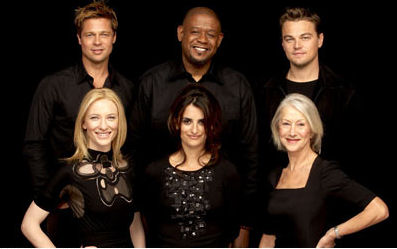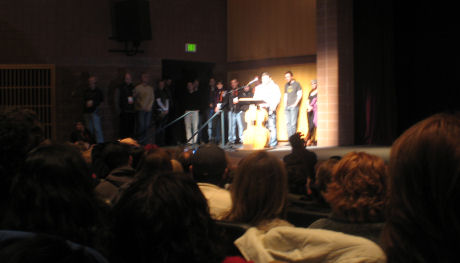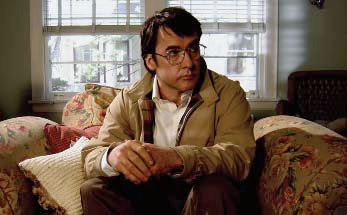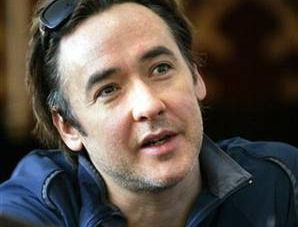“A friend who visited Atlanta this past weekend tells me that Little Children was one of the options at her hotel for in-room pay-per-viewing. So I can’t help thinking: No matter how many Oscar nominations the movie may receive on Tuesday, has New Line already written off the movie’s prospects as a theatrical release?” — recent entry on Joe Leydon‘s Moving Picture Blog.
Day: January 21, 2007
Major LMS Denial
In major denial: “I refuse to believe that Little Miss Sunshine, a movie the world loves but I loathed, is going to get a Best Picture nod.” — Salt Lake Tribune‘s Sean P. Means, in a piece about Tuesday’s Oscar nominations.
Oscar gang
An above-average, all-star Oscar roundtable — Helen Mirren, Penelope Cruz, Leonardo DiCaprio, Brad Pitt, Cate Blanchett and Forest Whitaker — by Newsweek‘s Sean Smith and David Ansen, including streaming video clips. From the 1.29.07 issue.

Sundance pics #7

Most of the cast (Kerri Russell, et. al.) plus the producers and the musical composer of Waitress, the late Adrienne Shelly’s final film which screened this afternoon at 3:15 pm at the Eccles — no time to get into reactions because I have to see Adrift in Manhattan 30 minutes from now at the Yarrow, and if I don’t get in line…
Reeler on Painting Kid
The Reeler‘s Stu VanAirsdale on (deep breath…no, two deep breaths) Amir Bar-Lev‘s My Kid Could Paint That, “already the subject of buying speculation after last week’s TV deal with A&E Indie Films and one of the more eagerly anticipated competition titles among festivalgoers. The anticipation paid off: Bar-Lev’s film is a meta-mix of doc ethics, art politics and family drama, a brilliantly paced mystery tale of a Binghamton, N.Y., four year-old whose abstract paintings develop a lucrative following before its authorship is drawn into question by an increasingly skeptical media…including Bar-Lev himself.”
Defending “Chicago 12
“Chicago 10 deliberately eschews context and perspective, the better to simply plunge the viewer into the maelstrom, as if these fires raged last week rather than four decades ago. [Brett] Morgen’s message, however, while implicit, couldn’t be much clearer. In lieu of a “comprehensive,” “dispassionate,” “balanced” portrait of the most explosive instance of American dissidence of the past half-century (at least), he gives us something much more valuable: a call to arms.
“Yes, the movie is blatantly stacked in favor of its hero-agitators, but it’s also impossible to watch Chicago 10 without becoming acutely aware of the vacuum at the center of the current anti-war movement, which has prompted countless marches and demonstrations but has produced no Abbie Hoffmans or Jerry Rubins. And it’s Morgen’s refusal to offer any kind of retrospective take on what we’re seeing – to give his doc the propulsive forward motion of a fictional narrative – that prompts us to make our own disheartening comparisons between past and present.” — from Mike D’Angelo‘s defense of Morgen’s film on Nerve’s Screengrab.com.
Why did “Sunshine” win?
The Envelope‘s Tom O’Neil attempts an explanation for Little Miss Sunshine‘s PGA Best Picture win.
Ready to go home
I’ve been through not-so-hot Sundance Film Festivals before, and even the bad ones had their occasional pleasures and surprises. It’s a little bit early to be asking if “this is the worst Sundance ever?” and then saying “yes, maybe”…like David Poland did yesterday. “We’re two days into the festival and the buyers are ready to go home,” he wrote. Let them go home already! There’ll be more room at industry screenings if they leave, right? Am I disappointed I haven’t seen something deeper, stronger, funnier, punchier? Yeah, I am, but there are five days to go, for Chrissake. Give it a rest.
Posey’s “Children”
I despise romantic comedies as a rule, but Zoe Cassevetes‘ Broken English is an exception, perhaps because it doesn’t try to be “funny” as much as sardonic and bitterly truthful about what a slog it is out there for no-longer-young women who are “looking for love,” or at least for a relationship that allows for the possibility of something nourishing and genuine.

For what it is and as far as it goes, English is very bright and absorbing, and it contains the most affecting and vulnerable performance of Parker Posey‘s 38-year life. She may seem to be doing the same thing here that she’s done in many films before; the difference is that there’s a bit more sadness in her features, a hint of a crack in her voice at times, and a greater willingness to show her buried child. Her performance is further enhanced by Cassevetes’ tip-top script.
After last night’s 7:30 screening I asked Toronto Globe & Mail critic Liam Lacey what he thought. “Not bad but thin,” he basically replied. I said, “Okay, yes, but the slightness is very smart. I mean, c’mon…have you ever seen a movie about a woman in her 30s looking for the right guy to fall in love with that satisfied your heavy-osity criteria?” He laughed.
The film gets rolling and digs in when Nora (Posey), a Manhattan hotel worker, meets Julian (Melvil Poupaud), a 30ish Parisian who seems soulful and sincere enough. The chemistry seems right, but then he takes off. Should Nora let it go and move on, or fly to Paris and see what happens next? In the hands of another director and with a lesser actress as Nora, a vehicle like Broken English might have been unwatchable. I mean, I usually hate shit like this. I wish that more romantic comedies were this smart and easy to sit through.
Drea de Mateo, Gena Rowlands and especially Justin Theroux provide tasty supporting performances. Theroux, playing a typically egoistic actor, is hilarious. He delivers his lines with just the right jaded aroma, never too broad or buffoony.
Grace is Gone
James C. Strouse‘s Grace is Gone, which I saw last night at 10 pm, is the best film I’ve seen so far at Sundance ’07. It’s a plain and pared down thing, emotionally subtle but very specific and often moving, familiar and understated with a Midwestern voice of its own — a family film about a very American, very here-and-now tragedy.

It definitely stands a chance of being remembered at year’s end, certainly for John Cusack‘s deeply touching performance (a major step forward given his career-long inhabiting of hip sardonic wise guys) and possibly in the Best Picture, Direction and Screenplay categories at the ’08 Spirit Awards, and perhaps beyond that. 2007 has barely begun, but Grace has the kind of quiet poignance and gravitas that lingers.
I heard last night that the Paramount Vantage team was circling, but the Hollywood Reporter guys have just broken the news that the Weinstein Co. has picked it up.
Grace is Gone is a rare Sundance film in that it bridges a red state-blue state sensibility. It is basically antiwar (and clearly anti-Bush), but at the same time non-judgmental in its portrait of a patriotic dad (Cusack) who’s barely coping with the news of his wife having just been killed, and particularly how to break the news to his two daughters (one of whom is played by Shelan O’Keefe).
Grace is humanistic and character-driven, but, as Sundance programmer John Cooper has written, the fact that it “can be construed as pro-military guarantees its greatest impact.” It’s a curious case — a movie made by anti-war blues that exudes heartfelt respect and compassion for the patriotic reds. I’m putting it a bit bluntly, but that’s the basic deal.

Grace is Gone director-writer James C. Strouse
There’s a shiftless-brother-of-Cusack character (Alessandro Nivola) who espouses antiwar views, but the film is apolitical in its focus on family grief and confusion. It’s obviously frowning at Cusack’s blind loyalty to the Bush cabal’s handling of the war but it doesn’t get into argumentative particulars or windy rhetoric. I can imagine this film playing in rural Republican/Bubba territory sometime later this year, and mainstream conservative guys and their wives and children coming out of the theatre and going, “Yeah…good film…solemn, truthful.”
Cusack’s Stanley Phillips goes into a kind of stunned tailspin when he hears news that his soldier wife, Grace, has been killed in Iraq. The extent of his meltdown is evident when he decides to hide the news from his daughters, deciding instead to take them on a road trip from their home in Minnesota to a Disney World-type amusement park in Florida.
He obviously needs to spill it sooner or later, but he puts it off and puts it off. His older daughter, 12, senses right away that something’s up but she doesn’t force or confront. Eventually her younger sister also starts to detect a certain vibe in the air. The movie is about the drip-drip-drip of truth seeping in, scene by scene, line by line. It takes its time getting there, but it never bores or drags.

Cusack, who produced along with four or five others, is an adamant anti-Iraq War leftie, and good for that. He feels, obviously, for those military people who’ve been killed so far, and believes that their tragedies shouldn’t be hidden. Cusack has been quoted as saying that the Bush administration’s policy of banning media coverage of America’s war dead as their remains are returned is “one of the most shameful, disgraceful, cowardly political acts that I’ve seen in my lifetime.”
The elegance of Grace is Gone, by contrast, is that it doesn’t “say” anything, but there’s no mistaking what it’s saying.
Sundance pics #6

Resurrecting The Champ director Rod Lurie, costar Teri Hatcher at last night’s post-Eccles-screening party for the sports-flavored film at ESPN house — 1.21.07, 12:35 am; Slipstream costar Christian Slater prior to yesterday afternoon’s screening of the film, directed and written by Anthony Hopkins; the fabled Chateau Apres, a sprawling, Alpine-styled crash pad for folks on a budget, located across a large, snow-covered field from the Park City Library; Slater in the snow, alternate angle; Rod Lurie, Resurrecting the Champ producer Bob Yari — 1.21.07, 12:15 am; Park City Library pre-screening ticket tent; Friday NIght Lights and Miracle only get honorable mention?
